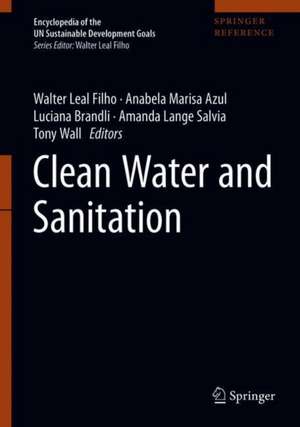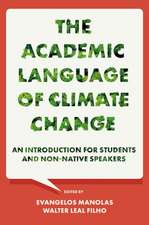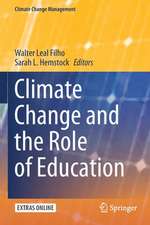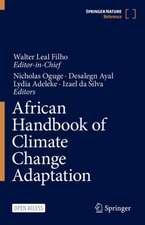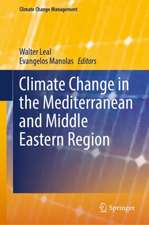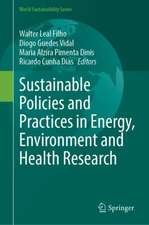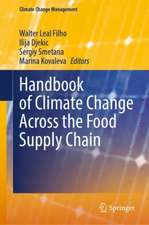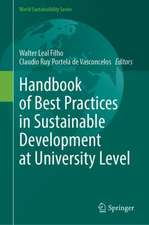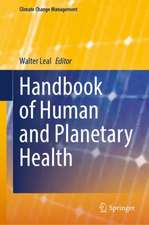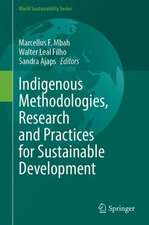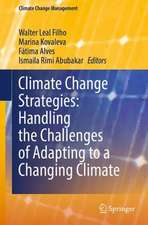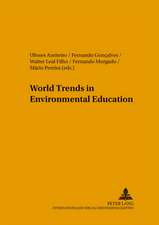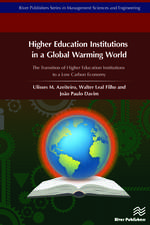Clean Water and Sanitation: Encyclopedia of the UN Sustainable Development Goals
Editat de Walter Leal Filho, Anabela Marisa Azul, Luciana Brandli, Amanda Lange Salvia, Tony Wallen Limba Engleză Hardback – 11 iun 2022
The problems related to the process of industrialisation such as biodiversity depletion, climate change and a worsening of health and living conditions, especially but not only in developing countries, intensify. Therefore, there is an increasing need to search for integrated solutions to make development more sustainable. The United Nations has acknowledged the problem and approved the “2030 Agenda for Sustainable Development”. On 1st January 2016, the 17 Sustainable Development Goals (SDGs) of the Agenda officially came into force. These goals cover the three dimensions of sustainable development: economic growth, social inclusion and environmental protection.
The Encyclopedia of the UN Sustainable Development Goals comprehensively addresses the SDGs in an integrated way. It encompasses 17 volumes, each devoted to one of the 17 SDGs. This volume is dedicated to SDG 6 "Ensure availability and sustainable management of water andsanitation for all". Water and sanitation are fundamental to human well-being. Integrated water resources management is essential to ensure availability and sustainable management of water and sanitation for all and to the realization of Sustainable Development.
Concretely, the defined targets are:
The Encyclopedia of the UN Sustainable Development Goals comprehensively addresses the SDGs in an integrated way. It encompasses 17 volumes, each devoted to one of the 17 SDGs. This volume is dedicated to SDG 6 "Ensure availability and sustainable management of water andsanitation for all". Water and sanitation are fundamental to human well-being. Integrated water resources management is essential to ensure availability and sustainable management of water and sanitation for all and to the realization of Sustainable Development.
Concretely, the defined targets are:
- Achieve universal and equitable access to safe and affordable drinking water for all
- Achieve access to adequate and equitable sanitation and hygiene for all and end open defecation, paying special attention to the needs of women and girls and those in vulnerable situations
- Improve water quality by reducing pollution, eliminating dumping and minimizing release of hazardous chemicals and materials, halving the proportion of untreated wastewater and substantially increasing recycling and safe reuse globally
- Substantially increase water-use efficiency across all sectors and ensure sustainable withdrawals and supply of freshwater to address water scarcity and substantially reduce the number of people suffering from water scarcity
- Implement integrated water resources management at all levels, including through transboundary cooperation as appropriate
- Protect and restore water-related ecosystems, including mountains, forests, wetlands, rivers, aquifers and lakes
- Expand international cooperation and capacity-building support to developing countries in water- and sanitation-related activities and programmes, including water harvesting, desalination, water efficiency, wastewater treatment, recycling and reuse technologies
- Support and strengthen the participation of local communities in improving Uwater and sanitation management
Editorial Board
Ulisses M. Azeiteiro, Anabela Marisa Azul, Luciana Brandli, Dominique Darmendrail, Despo Fatta–Kassinos, Walter Leal Filho, Susan Hegarty, Amanda Lange Salvia, Albert Llausàs, Paula Duarte Lopes,Javier Marugán, Fernando Morgado, Wilkister Nyaora Moturi, Karel F. Mulder, Alesia Dedaa Ofori, Sandra Ricart
Din seria Encyclopedia of the UN Sustainable Development Goals
- 18%
 Preț: 3893.48 lei
Preț: 3893.48 lei - 18%
 Preț: 3610.14 lei
Preț: 3610.14 lei - 18%
 Preț: 3367.85 lei
Preț: 3367.85 lei - 18%
 Preț: 3882.42 lei
Preț: 3882.42 lei - 18%
 Preț: 3896.62 lei
Preț: 3896.62 lei - 18%
 Preț: 3880.85 lei
Preț: 3880.85 lei - 18%
 Preț: 3344.20 lei
Preț: 3344.20 lei - 24%
 Preț: 3402.30 lei
Preț: 3402.30 lei - 18%
 Preț: 3359.96 lei
Preț: 3359.96 lei - 24%
 Preț: 2926.08 lei
Preț: 2926.08 lei - 18%
 Preț: 3408.87 lei
Preț: 3408.87 lei - 18%
 Preț: 3404.14 lei
Preț: 3404.14 lei - 18%
 Preț: 3413.60 lei
Preț: 3413.60 lei - 18%
 Preț: 3404.14 lei
Preț: 3404.14 lei - 24%
 Preț: 2427.06 lei
Preț: 2427.06 lei - 24%
 Preț: 2915.07 lei
Preț: 2915.07 lei
Preț: 3352.06 lei
Preț vechi: 4087.88 lei
-18% Nou
Puncte Express: 5028
Preț estimativ în valută:
641.39€ • 669.74$ • 529.65£
641.39€ • 669.74$ • 529.65£
Carte disponibilă
Livrare economică 26 martie-09 aprilie
Preluare comenzi: 021 569.72.76
Specificații
ISBN-13: 9783319958453
ISBN-10: 3319958453
Pagini: 1000
Ilustrații: XXIX, 1018 p. 225 illus., 203 illus. in color.
Dimensiuni: 178 x 254 x 57 mm
Greutate: 2.31 kg
Ediția:1st ed. 2022
Editura: Springer International Publishing
Colecția Springer
Seria Encyclopedia of the UN Sustainable Development Goals
Locul publicării:Cham, Switzerland
ISBN-10: 3319958453
Pagini: 1000
Ilustrații: XXIX, 1018 p. 225 illus., 203 illus. in color.
Dimensiuni: 178 x 254 x 57 mm
Greutate: 2.31 kg
Ediția:1st ed. 2022
Editura: Springer International Publishing
Colecția Springer
Seria Encyclopedia of the UN Sustainable Development Goals
Locul publicării:Cham, Switzerland
Cuprins
Adaptive Water, Sanitation and Hygiene Management: Resilient Governance Systems.- Adequate and Equitable Sanitation in Sri Lanka: Achievements, Issues, and Challenges.- Advanced Technologies in Water Treatment.- Approaches to Water Monitoring.- Capacity Building in Water Resource Management in Developing Countries.- Ceramic Water Filter as a Household Water Treatment System.- Citizen Science and Water Quality Monitoring: Evidence from Dublin and Beyond.- Constitutionality and the Co-management of Water Resources in Cameroon.- Contribution of Citizens to Preserving Local Freshwater Ecosystems.- Dam-Related Displacement and Sustainable Development Goal 6.- Dendrochemistry As Chronological Data Monitoring to Address Mercury Water Contamination.- Earth’s Water Distribution.- Ecosystem Services Approach and Natures Contributions to People (NCP) Help Achieve SDG6.- Effect of Water and Soil Quality on Crop Productivity.- Environmental and Ecological Flows for Sustainability.- Environmental Degradation’s Effect on the Gains Made in SDG6.- Ethics in Water Resource Management: Roles, Frameworks and Principles.- Fecal Sludge Management for Sustainable Cities: Glimpses from Kenya.- Gendered Water, Sanitation, and Hygiene (WASH) Equality: Challenges and Opportunities.- Global Water Resources: Distribution and Demand.- Good Ambient Water Quality.- Groundwater Quality in Arid Environments.
Notă biografică
Walter Leal Filho (BSc, PhD, DSc, DPhil, DEd, DL, DLitt) is a Senior Professor and Head of the Research and Transfer Centre "Sustainable Development and Climate Change Management” at Hamburg University of Applied Sciences in Germany, and Chair of Environment and Technology at Manchester Metropolitan University, UK. He is the initiator of the Word Sustainable Development Symposia (WSSD-U) series, and chairs the Inter-University Sustainable Development Research Programme. Professor Leal Filho has written, co-written, edited or co-edited more than 400 publications, including books, book chapters and papers in refereed journals.
Anabela Marisa Azul is a Researcher at the Center for Neuroscience and Cell Biology (CNC) and the Institute for Interdisciplinary Research of the University of Coimbra (UC, Portugal). She holds a Ph.D. in Biological Sciences, specializing in Ecology (2002, UC), and pursued her investigation on biology and ecology of fungi to pinpoint the role of mycorrhizal symbiosis for sustainability of Mediterranean forests under different land use scenarios at the Centre for Functional Ecology (CFE-UC), where she became an Associate Researcher (from 2009 to 2014). At CFE-UC, Marisa Azul developed a holistic approach that combined innovation in food production with sustainable development and public scientific awareness to multiple actors. At CNC, from 2014 on, Marisa Azul focuses her investigation on basic research and participatory research dynamics to pinpoint links between metabolism, health/disease, and sustainability. She has broad academic experience as a researcher working in participatory research and interdisciplinary that link biomedical and life/environmental sciences, social sciences, science education, science communication, and artistic forms. Her research interests also lie in bringing together the academy and social/economical players. She has been successful in attracting national and international funding, coordinating projects, and mentoring young researchers on the topics mentioned. She has co-authored over 40 scientific publications and book chapters, co-edited 4 books on Climate Change Management Series and 1 onWorld Sustainability Series published by Springer, co-authored 4 books for children and 2 comics, and co-produced 1 animation.
Anabela Marisa Azul is a Researcher at the Center for Neuroscience and Cell Biology (CNC) and the Institute for Interdisciplinary Research of the University of Coimbra (UC, Portugal). She holds a Ph.D. in Biological Sciences, specializing in Ecology (2002, UC), and pursued her investigation on biology and ecology of fungi to pinpoint the role of mycorrhizal symbiosis for sustainability of Mediterranean forests under different land use scenarios at the Centre for Functional Ecology (CFE-UC), where she became an Associate Researcher (from 2009 to 2014). At CFE-UC, Marisa Azul developed a holistic approach that combined innovation in food production with sustainable development and public scientific awareness to multiple actors. At CNC, from 2014 on, Marisa Azul focuses her investigation on basic research and participatory research dynamics to pinpoint links between metabolism, health/disease, and sustainability. She has broad academic experience as a researcher working in participatory research and interdisciplinary that link biomedical and life/environmental sciences, social sciences, science education, science communication, and artistic forms. Her research interests also lie in bringing together the academy and social/economical players. She has been successful in attracting national and international funding, coordinating projects, and mentoring young researchers on the topics mentioned. She has co-authored over 40 scientific publications and book chapters, co-edited 4 books on Climate Change Management Series and 1 onWorld Sustainability Series published by Springer, co-authored 4 books for children and 2 comics, and co-produced 1 animation.
Luciana Brandli, Ph.D., is an Associate Professor in the University of Passo Fundo, Brazil, working in the Ph.D. Program in Civil and Environment Engineering. Her current research interests include sustainability in higher education and green campus, management of urban infrastructure and sustainable cities, and the Agenda 2030 for sustainable development. She supervises a number of Master’s and Doctoral students on engineering and environment and sustainability issues and has in excess of 300 publications, including books, book chapters, and papers in refereed journals.
Amanda Lange Salviahas a degree in Environmental Engineering from the University of Passo Fundo, Brazil, and graduate studies focused on sustainable cities and universities. Her work focuses on the Sustainable Development Goals, the role of universities towards sustainability and the impacts of climate change. Amanda has experience with international studies assessing aspects related to the 2030 Agenda and sustainability in higher education. She is reviewer of various journals and is also a member of the editorial board of the International Journal of Sustainability in Higher Education.
Tony Wall (BSc Hons, PGDip, PGCHE, MA, MSc, EdD, MCIPD, NTFHEA) is the curator of Impact Incubators at Liverpool Business School in the UK and Visiting Professor at Stockholm University. He was previously the Founder and Head of the International Centre for Thriving, a global-scale collaboration between business, arts, health, and education to deliver sustainabletransformation for the common good. He is passionate about thriving and has published 200+ works, including articles in quartile 1 journals such as Nature Communications, The International Journal of Human Resource Management and Vocations and Learning, as well as global policy reports for the European Mentoring & Coaching Council in Brussels. Overall, his leadership and international impact in these areas have attracted numerous accolades including the prestigious Advance-HE National Teaching Fellowship and three Santander International Research Excellence Awards.
Caracteristici
Fosters knowledge to support the UN Sustainalbe Development Goals Comprehensively describes research, projects and practical action Provides sound basis to promote sustainalbe efforts
